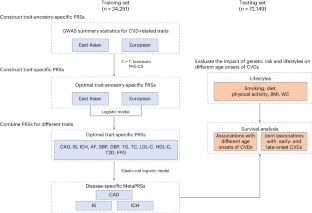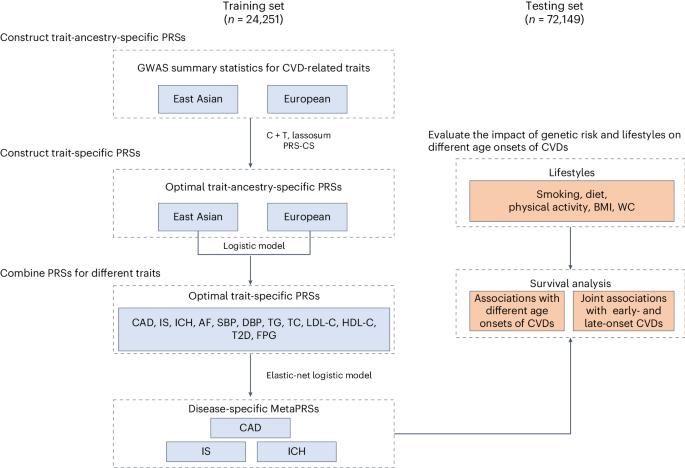Joint impact of polygenic risk score and lifestyles on early- and late-onset cardiovascular diseases
IF 15.9
1区 心理学
Q1 MULTIDISCIPLINARY SCIENCES
引用次数: 0
Abstract
Understanding the interactions between genetic risk and lifestyles on different types and age onsets of cardiovascular disease (CVD) risk can help identify individuals for whom lifestyle changes would be beneficial. Here we developed three polygenic risk scores, called MetaPRSs, for coronary artery disease, ischaemic stroke and intracerebral haemorrhage by combining PRSs for CVD and CVD-related risk factors in 96,400 participants from the prospective China Kadoorie Biobank. Genetic and lifestyle risks were categorized by the disease-specific MetaPRSs and the number of unfavourable lifestyles. High genetic risk and unfavourable lifestyles were found to be more strongly associated with early than late onset of CVD outcomes in men and women. Change from unfavourable to favourable lifestyles resulted in 14.7-, 2.5- and 2.6-fold greater reductions in incidence rates of early-onset coronary artery disease and ischaemic stroke and late-onset coronary artery disease in high than low genetic risk group. Young adults at high genetic risk may have larger benefits in preventing CVD from lifestyle improvements. Lifestyle improvements can achieve greater benefits in preventing early-onset cardiovascular disease in young adults at high genetic risk (as determined by polygenic risk score) than in other genetic risk groups.


多基因风险评分和生活方式对早发和晚发心血管疾病的共同影响
了解遗传风险与生活方式之间的相互作用对不同类型和年龄的心血管疾病(CVD)风险的影响,有助于确定改变生活方式对哪些人有益。在此,我们将前瞻性中国嘉道理生物样本库中 96,400 名参与者的心血管疾病和心血管疾病相关风险因素的 PRS 结合起来,制定了冠心病、缺血性脑卒中和脑内出血的三个多基因风险评分,称为 MetaPRS。根据疾病特异性 MetaPRS 和不利生活方式的数量对遗传和生活方式风险进行分类。结果发现,高遗传风险和不利的生活方式与男性和女性心血管疾病早发而非晚发的关系更为密切。从不利的生活方式转变为有利的生活方式后,高遗传风险组比低遗传风险组早发冠心病、缺血性中风和晚发冠心病的发病率分别降低了 14.7 倍、2.5 倍和 2.6 倍。遗传风险高的青壮年可能会从改善生活方式中获得更多预防心血管疾病的益处。
本文章由计算机程序翻译,如有差异,请以英文原文为准。
求助全文
约1分钟内获得全文
求助全文
来源期刊

Nature Human Behaviour
Psychology-Social Psychology
CiteScore
36.80
自引率
1.00%
发文量
227
期刊介绍:
Nature Human Behaviour is a journal that focuses on publishing research of outstanding significance into any aspect of human behavior.The research can cover various areas such as psychological, biological, and social bases of human behavior.It also includes the study of origins, development, and disorders related to human behavior.The primary aim of the journal is to increase the visibility of research in the field and enhance its societal reach and impact.
 求助内容:
求助内容: 应助结果提醒方式:
应助结果提醒方式:


